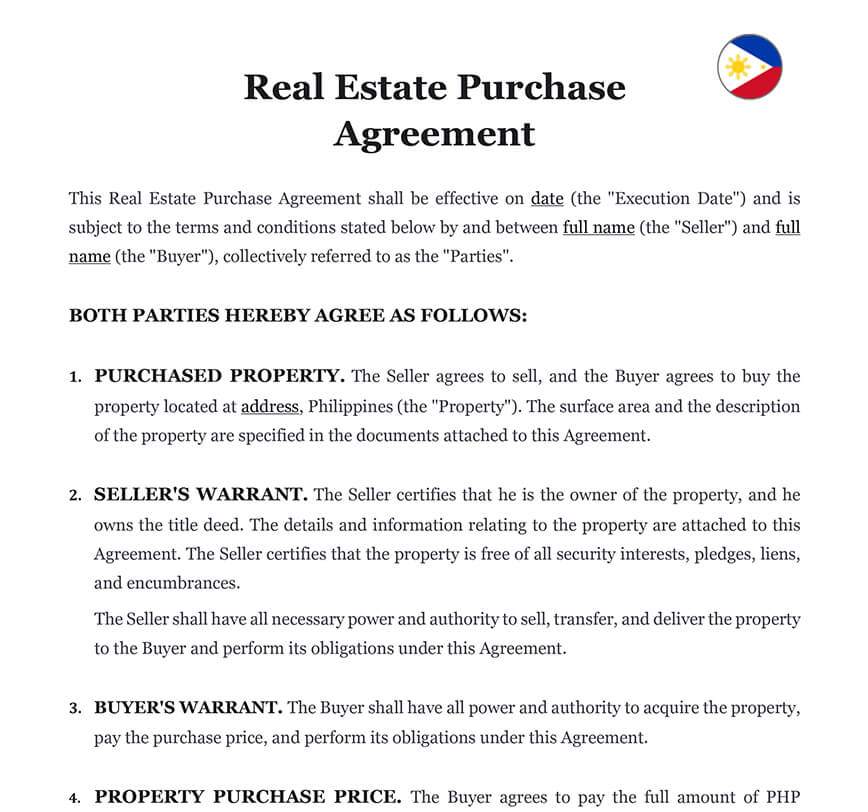How to sell real estate in the Philippines?
Selling real estate in the Philippines requires careful planning and execution to ensure a smooth and successful transaction. Here are the key steps to follow:
First, determine the market value of your property by conducting a thorough market analysis and consulting with real estate professionals. This will help you set a competitive and realistic selling price.
Next, prepare your property for sale by making necessary repairs and improvements to enhance its appeal. Consider staging the property to make it more attractive to potential buyers.
Create a comprehensive listing that highlights the key features and benefits of your property. Utilize various marketing channels such as online listings, social media, and print media to reach a wide audience.
Host open houses and schedule property viewings to allow interested buyers to personally inspect the property. Be prepared to answer questions and provide accurate information about the property.
Negotiate with potential buyers and carefully review offers. Seek legal services to ensure that the terms and conditions of the sale are fair and legally binding.
Once a buyer is secured, prepare the necessary documents for the sale, including the deed of sale, tax clearance certificates, and other relevant documents. Work closely with a trusted real estate lawyer to ensure compliance with legal requirements.
Finally, complete the transfer of ownership by executing the deed of sale, paying the necessary taxes and fees, and updating the property’s title with the appropriate government agencies.
How to transfer ownership of real estate in the Philippines?
Transferring ownership of real estate in the Philippines involves a series of legal and administrative processes. Here’s a general overview of the steps involved:
First, ensure that all legal requirements for the transfer of ownership are met. This includes securing necessary clearances and certificates from government agencies, such as tax clearance certificates and certification from the homeowners’ association, if applicable.
Prepare the necessary documents for the transfer, including the deed of absolute sale, tax declarations, and transfer tax receipts. These documents will be submitted to the Register of Deeds for the registration of the transfer.
Pay the required transfer taxes and fees. The exact amount will depend on the local government unit where the property is located.
Submit the documents and pay the necessary fees to the Register of Deeds. The Register of Deeds will review and verify the documents before processing the transfer of ownership.
Once the transfer is approved and registered, the new owner will be issued a new title reflecting their ownership of the property.
It is crucial to work with a trusted real estate lawyer who can guide you through the entire process, ensuring compliance with legal requirements and protecting your interests.
Please note that this is a general overview, and the specific requirements and processes may vary depending on the location and type of property. Consulting with a real estate professional or lawyer is highly recommended for personalized advice.
What are the legal requirements for selling real estate in the Philippines?
Selling real estate in the Philippines involves compliance with various legal requirements to protect the interests of both the seller and the buyer. Here are some key legal requirements to consider:
1. Ensure that you have the legal authority to sell the property. If you are the registered owner, make sure that the title is clean and free from any liens or encumbrances.
2. Secure the necessary clearances and certificates, such as the tax clearance certificate, certificate of non-forum shopping, and homeowners’ association clearances, if applicable.
3. Prepare a valid and enforceable deed of absolute sale. The deed should clearly state the terms and conditions of the sale, including the purchase price, payment terms, and any contingencies.
4. Obtain the necessary permits and clearances from government agencies, such as the Bureau of Internal Revenue, to ensure compliance with tax obligations.
5. Disclose all material information about the property to the buyer, including any defects or issues that may affect its value or use. Failure to disclose such information can lead to legal liabilities in the future.
6. Work with a licensed real estate broker who can assist in marketing and selling the property. The broker should be registered with the Professional Regulation Commission and the Philippine Association of Real Estate Boards.
7. Ensure that the buyer has the financial capacity to complete the transaction. Conduct due diligence on the buyer’s financial capability and request proof of funds if necessary.
How to navigate the process of selling property in the Philippines?
Step 1. Gather all necessary documents
Ensure you have all the relevant documents ready, including the title, tax declarations, tax clearances, and other supporting documents. Having these prepared in advance will expedite the process and avoid delays.
Step 2. Set a realistic selling price
Conduct a market analysis to determine the fair market value of your property. Setting a realistic selling price will attract potential buyers and increase your chances of a successful sale.
Step 3. Market your property effectively
Utilize various marketing channels such as online listings, social media platforms, and traditional advertising to reach a wider audience. Present your property in the best possible light by highlighting its unique features and advantages.
Step 4. Screen potential buyers
Conduct thorough due diligence on potential buyers to ensure they have the financial capability to purchase the property. Verify their financial standing and request proof of funds before proceeding with negotiations.
Step 5. Seek professional assistance
Consider hiring a reputable real estate agent or broker who has experience in selling properties in the Philippines. They can provide valuable insights, handle negotiations, and help streamline the selling process.
Step 6. Review and negotiate offers carefully
Carefully review offers and negotiate terms that are favorable to you as the seller. Seek legal advice if needed to ensure that the terms and conditions are fair and protect your interests.
Step 7. Complete the necessary paperwork
Prepare the necessary documents, such as the deed of absolute sale, tax declarations, and transfer tax receipts. Work closely with a real estate lawyer to ensure all legal requirements are met and the transfer of ownership is properly documented.
Step 8. Ensure a smooth transition
Coordinate with the buyer and relevant parties involved, such as the bank, if there is an existing mortgage on the property. Clear any outstanding obligations and ensure a smooth transition of ownership.
What are the considerations when transferring real estate ownership?
Transferring real estate ownership in the Philippines involves several important considerations. Here are key factors to keep in mind:
1. Title verification: Verify the authenticity and validity of the property’s title. Conduct a thorough review of the title to ensure it is clean and free from any encumbrances or legal issues that may affect the transfer of ownership.
2. Taxes and fees: Understand the taxes and fees associated with the transfer of real estate ownership. This includes transfer taxes, documentary stamp taxes, registration fees, and capital gains taxes. Familiarize yourself with the applicable rates and ensure compliance with the tax obligations.
3. Legal requirements: Comply with legal requirements for transferring ownership, such as securing a notarized deed of absolute sale, obtaining tax clearances and certificates, and securing necessary permits and approvals from government agencies.
4. Outstanding obligations: Ensure that all outstanding obligations related to the property, such as utility bills, homeowner association dues, and mortgage payments, are settled before the transfer of ownership. This will prevent any complications or liabilities from being passed on to the new owner.
5. Professional assistance: Consider engaging the services of a real estate lawyer or a reputable real estate professional to guide you through the transfer process. They can help ensure compliance with legal requirements, review and prepare the necessary documents, and facilitate a smooth transfer of ownership.
6. Buyer qualifications: Verify the qualifications of the buyer, including their financial capacity to assume ownership of the property. Conduct due diligence and request necessary documents to assess the buyer’s ability to fulfill their obligations.
7. Documentation and registration: Prepare all necessary documentation, including the deed of absolute sale, tax declarations, and other supporting documents. Work closely with a real estate lawyer or a registered notary public to properly execute and register the documents with the appropriate government agencies.
8. Post-transfer responsibilities: Clarify post-transfer responsibilities, such as the transfer of utility services, updating property records, and notifying relevant parties of the change in ownership. Ensure a smooth transition by coordinating with the buyer and relevant service providers.
By considering these factors and seeking professional advice, you can navigate the process of transferring real estate ownership in the Philippines with confidence and ensure a legally sound and hassle-free transaction.
What are the considerations when transferring real estate ownership?
When selling property in the Philippines, it’s important to keep in mind some valuable tips to maximize your chances of a successful sale. Firstly, it is crucial to set the right price for your property. Determine a competitive and realistic selling price by conducting market research and seeking professional valuation if needed. A well-priced property is more likely to attract potential buyers.
In addition to pricing, enhancing the curb appeal of your property can significantly impact buyer interest. Ensure that the exterior is well-maintained, the landscaping is neat, and the property is clean and presentable. First impressions matter, and a visually appealing property can capture the attention of potential buyers. Consider staging the interior of the property to showcase its potential. Depersonalize the space, declutter, and highlight its best features. Creating a welcoming and inviting atmosphere allows potential buyers to envision themselves living in the space, increasing their emotional connection to the property.
Effective marketing is essential in reaching a wider audience. Utilize various marketing channels, such as property listing websites, social media platforms, and real estate portals. Utilize high-quality photos, engaging descriptions, and highlight the key selling points of the property to attract potential buyers. Engaging a reputable real estate agent who has experience in selling properties in the Philippines can provide valuable market insights and assistance throughout the selling process. They can handle negotiations on your behalf, offer guidance, and help navigate the complexities of the real estate market. Prepare all necessary documents related to the property in advance. Gather the title, tax declarations, survey plans, and any relevant permits or licenses. Having these documents readily available can expedite the transaction process and provide potential buyers with the necessary information they require.
Being responsive and accommodating to inquiries and requests from potential buyers is crucial. Respond promptly, make yourself available for property viewings, and accommodate reasonable requests for additional information or property inspections. Building a good rapport with potential buyers can positively influence their decision-making process.
Lastly, seeking legal advice from a real estate lawyer is important to ensure compliance with legal requirements and protect your interests throughout the selling process. For exemple, Themis Partner helps you to make sure your protect your companys interests.
ℹ️ If you are considering transfering your property in the Philippines, Themis Partner offer a Real Estate Purchase Agreement that ensure a total compliance with the Philippines Laws.
Ask our Experts advice for your Real Estate Ownership management.
310 client reviews (4.8/5) ⭐⭐⭐⭐⭐











